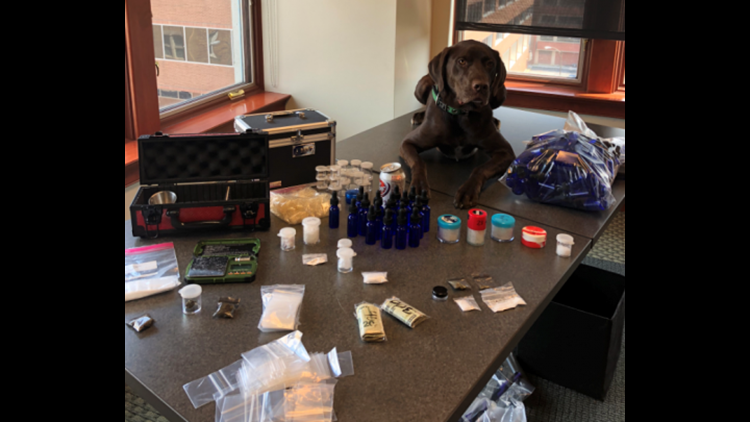LANCASTER — The Lancaster County Drug Task Force is facing a funding crisis in the near future, according to District Attorney Craig Stedman, who is asking the county to address “the long-term lack of reliable and consistent funding.”
Stedman said the Task Force, which targets mid- to upper-level drug dealers and monitors trends in drug trafficking and drugs of choice, needs funds to continue to battle the ongoing opioid epidemic, along with a developing methamphetamine epidemic in the county.
He asked the county’s board of commissioners to provide a more stable funding stream for the Task Force at a recent budget meeting.
The county currently provides a small percentage of operating costs for the Task Force, which has operated since 1988. The Task Force consists of a team of detectives from municipal police departments, who use undercover and surveillance tactics to combat higher-level trafficking across the county, conduct search operations, and file criminal charges.
At the Oct. 31 meeting, Stedman said that although education, prevention, and long-term treatment are critical, “enforcement is part of the answer” to slowing the epidemic and specifically dealing, which is trending locally to include more methamphetamine-dealing.
Cocaine also remains prevalent with dealers, Stedman says.
Stedman points to his office’s treatment of fatal overdoses as potential homicides, along with its harsh policies against predator-level heroin and fentanyl dealing, as a reason for dealers’ recent change in approach. Some dealers now are selling drugs which do not carry the same overdose risks, according to the Task Force.
Lancaster County leads the entire state of Pennsylvania in drug delivery resulting in death convictions, Stedman’s office says. Stedman cites news reports that say York and Dauphin counties have seen increases in overdose deaths this year, while Lancaster County’s fatality rate has dropped.
The Task Force operates largely on assets and funds gained in forfeitures and voluntary contributions from municipalities, according to Stedman. The state Attorney General also provides some funds, but that is voluntary and has decreased significantly over the years.
The county is the final source of funding, and pays only about 15 percent of the operating costs of the Task Force, Stedman says.
That “simply isn’t enough for the value the county is getting,” Stedman said at the meeting budget meeting. “We are no doubt saving lives, we’re saving communities.”
The formula needs to change in order to keep the Task Force going, Stedman added.
Forfeiture funds, amassed from seizures of drug-related assets and cash, vary from year to year.
The Task Force, according to Chief Detective John Burkhart, has been getting by in recent years largely due to two big seizures, the biggest in 2011.
“We’re on the verge of a methamphetamine epidemic,” Burkhart told the commissioners. (The Task force has made 30 meth-related arrests and executed 13 meth-related search warrants this year.)
Also, more municipal police departments want to contribute an investigator to the Task Force due to the current epidemic situation.
Yet, Burkhart said, the Task Force could not afford to pay them under the current funding mechanism.
Municipality leaders have been asked, since the Task Force’s inception 30 years ago, to contribute a dollar per person in their municipalities.
Some contribute that dollar, some contribute a fraction; some contribute nothing at all.
Even if all municipalities contributed in full, current DTF funding would still fall short.
Stedman said this funding scheme is a failure: “We can’t ignore it, the Board of Commissioners can’t ignore it.”
Stedman pointed to an analysis done by Lancaster County Budget Services in 2014, and recently updated, that shows the impending funding shortage.
At the meeting, Maggie Weidinger, director of budget services, said the Task Force would not be sustainable by 2020.
Commissioner Craig Lehman said options include making the current, shared-responsibility system work or operate off a completely different funding model.
Stedman stressed “this is the best Task Force we have ever had” while asking the board to “take the lead” in committing to a permanent funding solution.



